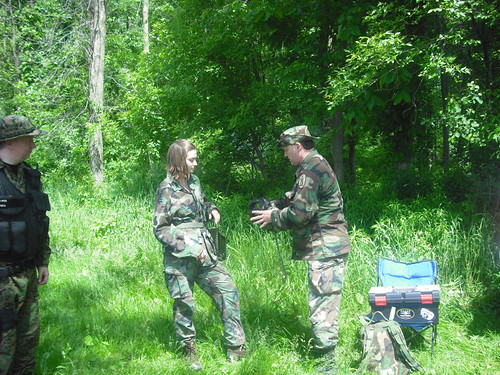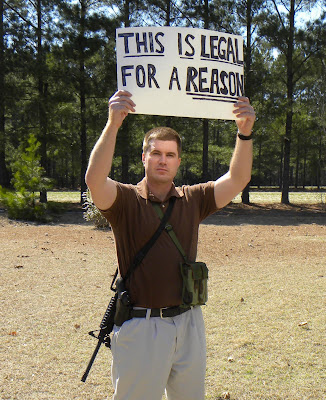The tone of the article indicates Ms. Cooter may be seeking to bring some balance and reality to an emotional subject. She implies that many of the "facts" about militia members as reported in the media are inaccurate. This is certainly in keeping with the revelations in To Shake Their Guns in the Tyrant's face by Robert H Churchill.Sociologist: How to understand militias
News Type: Event — Tue Mar 30, 2010 9:05 AM EDT
Amy Cooter, in the photo above, has spent the past few years getting to know people in Michigan's militia movement. Cooter's writing a sociology dissertation based on her field work at the University of Michigan. After Monday's news about the arrests of nine members of the Hutaree, an extremist Christian militia based in that state, she agreed to share with us some of what she's learned. Cooter writes:
"Probably the most important thing to know about the Militia Movement is that it is less cohesive and unified than we typically think of social movements or nation-wide interest groups as being. That is, groups of the Militia Movement even within a given state can vary as much or more than groups separated by state lines. There is really no such thing as the Michigan Militia as a result, although the highly visible Southeast Michigan Volunteer Militia and groups with which it associates do have more in common than not. The beliefs and actions of the indicted Hutaree members, on the other hand, represent an extreme of the militia movement.
"This may be surprising, since most news stories on militias tend to focus on this very extreme, following a raid like this one, and represent it as the mainstay of the movement. However, in contrast to the stereotypes, the vast majority of militia members are married, have children, have steady jobs (some even work for the government), and are not religious. Most care deeply for their country, vote at every opportunity, and frequently contact the elected representatives to express their viewpoints.
"Why is it important to recognize variation in this movement? At a general societal level, it's a slippery slope to start limiting the rights of people who are not advocating violence or otherwise breaking the law. Practically, the more media and hate-watch groups confuse and over generalize the overall movement with its most extreme components, the more the movement may be pushed in that direction. We saw this after the Oklahoma City bombing in 1995 when it was falsely reported that the bomber was a militia member. In the aftermath, some groups did dissolve, but many others went completely underground where they became harder to monitor, and it became more difficult to discern which ones might become problematic.
"More recently, when the Department of Homeland Security released the 'Rightwing Extremism' report last April, veterans -- especially those recently returned from the Middle East -- felt the government was accusing them of being terrorists. Attendance at militia events in my area roughly doubled, and most new attendees had military experience. They talked of feeling offended and betrayed, and they were seeking an outlet for protest. Clearly, this was the exactly opposite the outcome DHS had wanted.
"Comparing the brunt of the movement to the extreme, in short, irritates its members. It further alienates the ones who see their militia involvement as a political statement against a two-party system that, in their view, does not adequately represent their interests. It makes them less likely to interact with the public, to hold open events, and, potentially, to cooperate with law enforcement."
Sociologist Amy Cooter is writing a dissertation on the militia movement at the University of Michigan.
After reading Churchill's book I began to understand that the media created boogieman did not really exist. I hope this young woman can uncover more of the reality of the militias and I wish her luck in her research.


